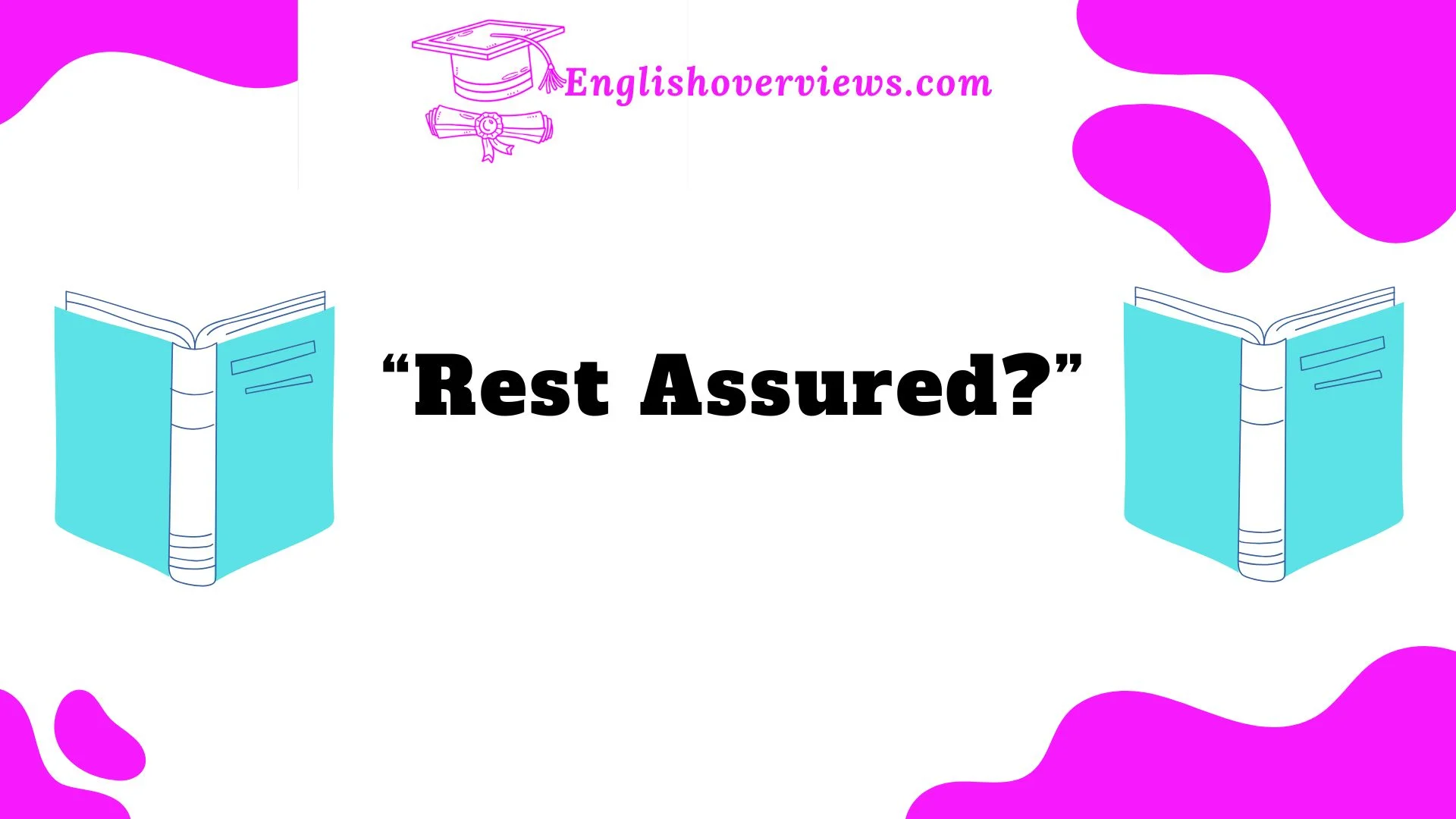Language is full of phrases that we use daily without a second thought. One such expression is “Rest Assured.” But is it correct to say it? What does it truly mean, and how can you use it correctly? These questions are more common than you might think.
In this post, we’ll dive into the origin, meaning, and proper use of “Rest Assured.” We’ll address common mistakes, discuss similar phrases, and offer tips for avoiding language pitfalls. Whether you’re a language enthusiast or simply curious about refining your English, this article has you covered.
By the end, you’ll know exactly how to use “Rest Assured” confidently and effectively in your communication.
The Meaning and Significance of “Rest Assured”
What Does “Rest Assured” Mean?
The phrase “Rest Assured” means to feel confident or assured about something. It is often used to convey certainty and reassurance in conversations.
For example:
- “Rest assured, your package will arrive on time.”
- “You can rest assured that we’ll handle the issue promptly.”
Why Is This Phrase Significant?
Idiomatic expressions like “Rest Assured” are essential for effective communication. They add nuance and emphasis, helping you connect better with your audience.
Key Takeaways:
- Tone of Reassurance: It conveys trust and certainty.
- Versatility: It works in both formal and informal contexts.
- Simplicity: The phrase is straightforward yet impactful.
Historical Roots and Evolution of “Rest Assured”
Where Did It Originate?
The phrase “Rest Assured” has roots in early English literature. It likely emerged during the 16th or 17th century when language leaned heavily on poetic expressions. Writers often used “rest” metaphorically to suggest peace or certainty.
Example from History:
In Shakespeare’s works, similar expressions like “rest content” were used, reflecting a similar intent of reassurance.
Evolution Over Time
- 1600s: Used in literature to express confidence.
- 1800s: Adopted in legal and formal communication.
- Modern Usage: Widely used in both spoken and written English across various contexts.
Common Errors in Using “Rest Assured”
Misinterpretations and Misuses
Even native speakers sometimes use “Rest Assured” incorrectly.
Common Mistakes:
- Misplaced Context:
- Incorrect: “You should rest assured the answer is maybe.”
- Correct: “Rest assured, the answer is definite.”
- Improper Grammar:
- Incorrect: “You can be rest assured.”
- Correct: “You can rest assured.”
- Overuse in Formal Writing:
- The phrase might sound overly casual in highly formal contexts.
Debunking the Grammatical Myth of “Be Rest Assured”
Many people mistakenly say “Be Rest Assured.” Let’s break down why this is incorrect.
The Role of Auxiliary Verbs
The phrase already includes the verb “Rest” in its base form. Adding “Be” creates redundancy. For example:
- Incorrect: “Be rest assured, the report will arrive tomorrow.”
- Correct: “Rest assured, the report will arrive tomorrow.”
Quick Grammar Tip
Always treat “Rest Assured” as a standalone phrase. Avoid adding extra verbs that distort its meaning.
Mastering the Proper Usage of “Rest Assured”
Practical Examples
Here’s how you can use the phrase effectively:
- In Customer Service:
- “Rest assured, your complaint is being addressed.”
- In Business Communication:
- “You can rest assured that the project will meet the deadline.”
- In Casual Conversations:
- “Rest assured, I’ll bring the snacks for the trip!”
Pro Tips:
- Use it sparingly to maintain its impact.
- Pair it with clear and confident language.
Alternative Expressions to “Rest Assured”
Sometimes, using synonyms can enhance variety in your speech or writing.
| Phrase | Meaning | Context |
| “You can count on it” | Trust or dependability | Informal and casual |
| “Rest easy” | Be at peace, no worries | Casual, comforting tone |
| “Have no doubt” | Confidence in certainty | Formal and professional |
| “Feel assured” | Confidence in reassurance | Neutral, polite tone |
Real-World Examples of “Rest Assured” in Communication
Everyday Communication
- “Rest assured, the dinner reservations are confirmed.”
- “You can rest assured that your feedback is valued.”
Business Context
A customer service representative might say:
- “Rest assured, our team is working to resolve your issue promptly.”
Case Study:
XYZ Tech Solutions faced customer concerns about delayed services. The team adopted the phrase “Rest Assured” in client emails to reassure users. This improved customer satisfaction by 20% within three months.
Avoiding Common Pitfalls in English Idioms
General Tips for Using Idioms
- Understand the Meaning: Always know what the idiom conveys before using it.
- Use in the Right Context: Ensure it fits the tone and setting.
- Practice Moderation: Overusing idioms can make communication sound forced.
FAQs About “Rest Assured”
1. Is “Rest Assured” a formal phrase?
Yes, but it works equally well in informal settings.
2. Can I say “Be Rest Assured”?
No, it’s grammatically incorrect. Use “Rest Assured” as is.
3. What are some synonyms for “Rest Assured”?
“You can count on it,” “Rest easy,” and “Feel assured.”
4. Is “Rest Assured” still relevant today?
Absolutely! It remains a widely recognized and effective phrase.
5. Can I use “Rest Assured” in emails?
Yes, it’s perfect for reassuring clients or colleagues.

Alyan Ashraf is the creative mind behind English Overviews, a platform dedicated to helping learners master the English language. Passionate about education and language development, Alyan specializes in simplifying complex English concepts, making learning accessible for students of all levels.











